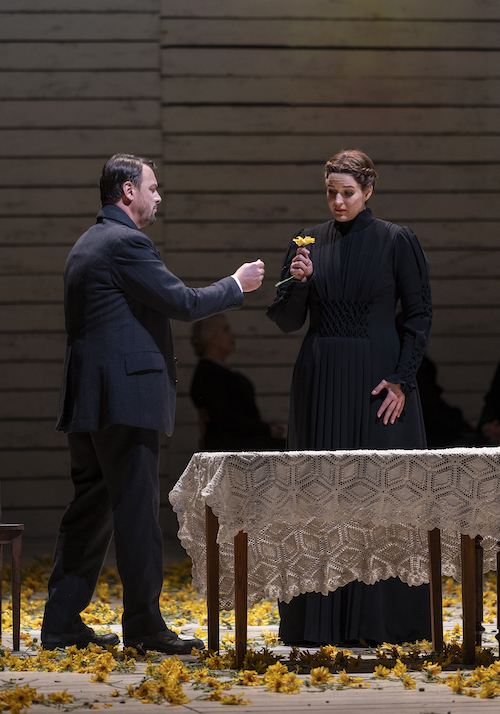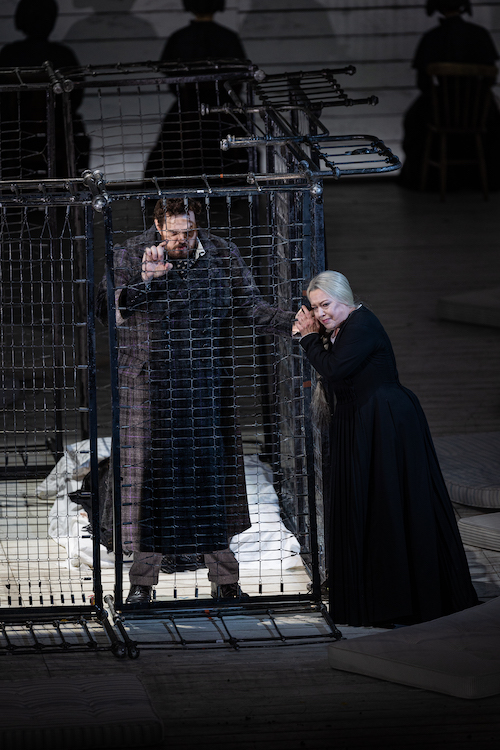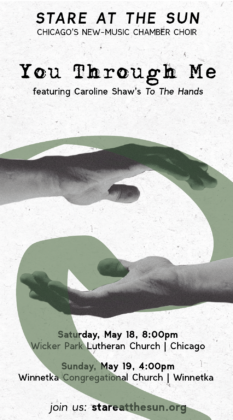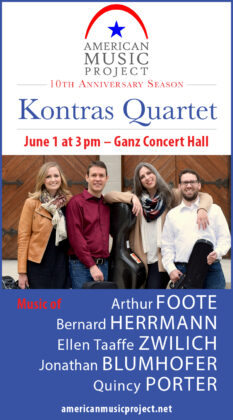Janáček’s drama, strong cast undermined by postmodern cliches in Lyric Opera’s “Jenůfa”

Suddenly the big rock doesn’t seem so bad.
When Leoš Janáček’s Jenůfa was last seen at Lyric Opera in 2000, it was presented in a minimalist production with a massive rock center stage. The ominous boulder at least was a bit of symbolism that is specifically referenced in the libretto.
That lean staging seems like a model of traditionalism, however, compared to the unremittingly bleak production unveiled Sunday at Lyric’s opening performance of Jenůfa. In what has become the weary leitmotiv of the soon-to-end Anthony Freud era, a strong cast was undermined by a hapless postmodern staging that distracted from the characters and diluted the psychological complexity of Janacek’s gripping drama rather than serving it.
It’s not like the scenario of Jenůfa needs to be made any darker than it already is. The story tells of the good-hearted title village girl who is in love with her cousin, the irresponsible and dissolute Števa, who has made her pregnant. His younger half-brother Laca is in love with Jenůfa and, bitter over her rejection of him for Števa, slashes her face with a knife. The opera doesn’t get lighter from there, dealing with fanaticism, insanity and infanticide. Yet the darkness of Janáček’s unsentimental realism is tempered by an overriding theme of forgiveness, even for the most horrific of acts.
Janáček’s music for Jenůfa is extraordinary and there is nothing quite like it in the repertoire. The score is a roiling, restless torrent imbued with a pungent folk-like flavor, the music seamlessly fitting the Czech language and Moravian speech patterns. The mercurial nature of the score is so imbedded in the national idiom that it seems like the most natural thing in the world when the music abruptly segues into dancing or folk singing.
Performances of Janáček operas are rare things in Chicago and it’s been 14 years since the last local outing with Katya Kabanova. Which makes director Claus Guth’s hubristic Jenůfa staging (abetted by revival director Axel Weidauer) even more maddening.
The opera opens not in the outdoors by a mill stream but in what looks like an industrial autopsy room. A lineup of beds line the back and right walls where unsmiling women in black are seated, skinning potatoes in unison motions like robots. The men all get out of bed and get dressed, similarly like automatons. What a subtle way to get across the narrow restrictive milieu of the Czech village as well as upstaging the principal singers.
The elephantine symbolism gets worse. The cottage in Act II for Jenůfa and the Kostelnicka is a tiny, claustrophobic wired cage that resembles a chicken coop or dog kennel. The women occasionally exit this microbial PAWS shelter to sprawl on scattered mattresses. A large half-puppet of a black crow enters and watches the proceedings.
It’s laughable that directors think they are being so daring and profound when, in reality, they are recycling the same handful of hoary postmodern cliches that have been a staple of bad European opera productions for the past three decades.
Nearly every tired gimmick makes an appearance here (some familiar from Christopher Alden’s soulless staging of The Flying Dutchman in September), none of which serves the opera, the singers nor the storyline: scattered empty chairs; bleak industrial sets; singers sitting immobile facing the back wall; shadowy Night of the Living Dead lighting; and the excision of humanity from the characters and nearly any ray of optimism or happiness. Just as one was thinking, “Well, at least he didn’t have a child actor appear as the ghost of Jenůfa’s son,” guess who walks across the stage?
The visual ennui also has a distancing effect—diluting the emotional intensity of the drama and turning the characters into static archetypes rather than real, psychologically complex humans.
Ultimately, the production isn’t as fatal as Alden’s demolition job on Wagner—Guth at least doesn’t rewrite the opera’s optimistic ending and Act III has fewer directorial idiocies. Still, by then the damage has been done.

Once again one felt sorry for an excellent cast, who were ill served by this production.
In the title role, Lise Davidsen proved a vocally resplendent heroine in her belated company debut. The statuesque Norwegian soprano possesses a voice of striking quality and richness, filing the hall with sumptuous tone in Janáček’s most emotional moments. Dramatically she was about as successful as the stilted staging allowed, bringing emotional desperation to Jenůfa’s Act II prayer—despite the silent, black-clad women climbing the walls behind her—and conveying the woman’s conflicted anguish and redemptive acceptance in the final act.
Nina Stemme provided a worthy performance as the Kostelnicka, Jenůfa’s unbalanced stepmother who is driven over the edge by the threat of scandal over the girl’s pregnancy. While it was good to have a younger singer than usual in this role, there was less of a payoff vocally than one might have thought. The Swedish soprano brought dramatic commitment to the character and made her eventual contrition register. Yet while mostly well sung, the Kostelnicka’s breakdown lacked the kind of scary, searing intensity the scene demands.
The brothers who vie for Jenůfa’s affections were both vocally distinguished in their company debuts if somewhat physically mismatched for the roles. The husky Richard Trey Smagur would seem better suited to Laca than the “golden-haired” Steva, though the American tenor had the vibrant voice and careless attitude suitable for the selfish character.
Pavel Černoch proved a better fit as Laca, who, despite his rash act toward Jenůfa, turns out to be the more responsible and selfless individual. The sole Czech singer in the cast, Černoch, sang with a febrile, liquid tenor and credibly charted the character’s progression from volatile hothead to tempered maturity.
Marianne Cornetti proved a reassuring presence as Grandmother Buryja, and Laureano Quant was a younger, more assertive Foreman than is usual.
Wayne Tigges was a big-voiced Mayor. Though their ditsy characters verge on caricature here, Katherine DeYoung as the Mayor’s Wife and Lucy Baker as Karolka, their daughter and Steva’s fiancee, etched worthy cameos. Rounding out the cast solidly were Kathryn Henry as the boy Jana, Lindsey Reynolds as Barena and Sophia Maekawa as the Shepherdess, all Ryan Center members.
Jakub Hrůša is a popular guest with the Chicago Symphony Orchestra, having led Mahler’s Ninth Symphony, no less, in June. As one might expect, the Czech conductor showed an idiomatic hand and close sympathy with the score in his Lyric Opera debut. Despite being presented in Janáček’s original version, which is punchier and less lushly romantic, the music emerged more rounded and lyrical than usual. At times, the orchestra sounded somewhat muted—as heard from the far left side of the main floor—and one wanted more of Janáček’s sharp edges and tangy wind writing to come through.
Jenůfa runs through November 26. lyricopera.org
Posted in Performances





Posted Nov 13, 2023 at 12:37 pm by John
Having Stemme and Davidsen is some of the best luxury casting in Chicago in many years. I’ll see it mid-week, but the production sounds dismally familiar in the Freud era. Hopefully the Lyric will be able to heal and re-build its audience once he’s gone.
Posted Nov 13, 2023 at 1:26 pm by Margaret Atherton
You know, generally I agree wholeheartedly with your strictures about the staging–certainly most recently in the case of Dutchman–but my feeling about this one was that, all things considered, it wasn’t so bad and except in a few cases, that bird and the strolling boy, it didn’t distract from my enjoyment of the music, which was huge.
I was less enthusiastic about the Laca, who seemed underpowered, however. But overall it was an excellent experience of an opera I didn’t know at all.
Posted Nov 13, 2023 at 1:28 pm by Phil
I attended this premiere performance, and disagree with some of your sentiments. We didn’t find the minimalist staging to be so jarring. (There was a bit of a Atwood’s “Handmaid’s Tale” atmosphere, but we thought it worked well to help generalize the unending struggles that women like Jenufa and the Kostelnicka face in society. We especially liked how the women’s hats projected as vulture’s beaks during the second act.) The two female leads were spectacular, and Lise Davidsen’s prayer truly stopped time.
Sitting in the center upper balcony, we consistently found the male leads to be much quieter than the females, which led to frustratingly poor balance in duets and trios. The orchestra was good at the start, but became notably much stronger in the 2nd act (with one small blooper from a brass player in the final bars). Overall, we give it a B+.
Thanks for being the foundation of Chicago’s musical reviewers!
Posted Nov 13, 2023 at 2:41 pm by Adornian
I absolutely agree about the production. I found Jenufa’s forgiveness of her mother entirely estranging and at odds with the score–sitting there in a chair, looking away.
Posted Nov 14, 2023 at 11:40 am by Richard Sutro Rothschild
Thanks for the review, Lawrence. Looking forward to seeing “Jenufa” for the first time Wednesday afternoon. And, yes, “The Flying Dutchman” was a horror.
Also, I wonder if Lyric is having problems selling tickets to “Jenufua”; not exactly “Carmen” or “Boheme” when it comes to crowd appeal. My balcony ticket was upgraded to 12th row orchestra!! Do you think there were too many open seats close to the stage and Lyric didn’t want to be embarrassed?
Posted Nov 16, 2023 at 3:30 pm by Philip Kraus
I was privileged to play the Mayor in the previous Lyric Opera production of Jenufa. It was directed by Richard Jones in a taut, fairly traditional (by today’s standards) production. It starred Patricia Racette and was one of the finest things I did in my 25 year career at Lyric. I was also in Lyric’s charming production of Cunning Little Vixen, so I am familiar with Janacek’s unique operatic perspective.
A shame that there haven’t been more Janacek operas at Lyric and that this production is another directorial ego trip.
Posted Nov 18, 2023 at 9:28 am by Erem Bobrakov
Bravo Mr. Johnson! You remain the indefatigable voice of reason and good taste on the local scene. Mr. Anthony Freud and co-creators of his artistic vision appeared to have succeeded in punching a hole in the basement of minimally acceptable standards of the art of opera.
I also believe “we the people” share part of the blame. I remember that in the Opera Bastille when Les Troyens was staged for the first time in over 30 years the fully packed house was enthusiastically booing the production for about quarter of an hour. Chicago audience politely remained silent and just stopped attending.
Like me.
Posted Nov 22, 2023 at 12:12 am by Alan Goldberg
Having just seen this production tonight (November 21), I have to disagree with the review. I actually found the staging quite interesting and found that it in no way detracted from the musical experience (unlike that awful Dutchman staging). And the singing and orchestral playing were superb.